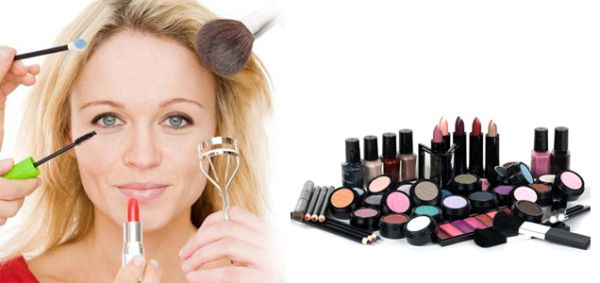Why we are asking this now?
When you follow something as a routine, there hardly remains scope for a second opinion on the subject. Women can find make-up as their best and trustworthy friend on numerous occasions. It would seem too taxing for professional women to do without make-up (even though light) considering the needs of routine lifestyle and presentation.
However, everything which goes into the routine is not necessarily meant for the good. When used incorrectly, make-up can potentially be your skin’s foe. Surprisingly, women can use up to 12 cosmetic products in a day! This can put them at increased risk due to more than 100 different chemicals used within.

Everything which is applied externally has an effect, whether good or bad. Demarcating between the good and bad can be rewarding in the long run, considering the significance of the skin. Taking sometime to ascertain whether make-up brings in more good than bad is worth considering.
Is it really that serious?
Usually, makeup may not have any major negative effects. However, make up can give rise to some skin problems or reactions, depending on your skin type. The chemicals found in several of these products can potentially result into many adverse reactions, damaging your skin.
Sometimes, there is a thick oily sheen on face which should not be mistaken as having a youthful glow. This can be due to oil-based foundations and creamy powders, particularly when you have an oily skin. Foundation or powder can also cause dry skin. Cosmetics potentially cause cracks and fine wrinkles. These could emerge into infection later on. Dry skin is also itchy and liable to crack soon. Foundations and powders which potentially clog the pores and hair follicles can aggravate acne.
For a woman having sensitive skin, allergy is commonly found when using make up product(s). The preservatives (like parabens and formaldehyde) and fragrances can possibly lead to allergies. Even the regular cosmetic ingredients can cause allergies. Sodium lauryl sulphate (chemical for increasing the spread ability of products like cream) can also be a source of allergy to many skin types. Allergy can be the irritant contact dermatitis or the allergic contact dermatitis. The contact dermatitis is likely to be more troubling. It can appear in the form of swelling, itching, or blisters.
What can be done?
While ruling out the use of cosmetics may seem impractical in today’s world, you can certainly find certain ways which can minimize (or avoid) the damage. When you are purchasing cosmetics, be careful about your skin type. For sensitive skin, opt for makeup products which are not fragrant and are oil-free. The water-based foundations and loose powders may be better suited. If your skin is naturally dry, practice proper cleansing and moisturizing. For itching skin, using a moisturizer (or oil such as jojoba or avocado) about five minutes before the foundation or powder helps. A hydrating foundation or powder is also a potential solution. A sun-protective factor in the product is a preferable choice.
The hypoallergenic products are less likely to cause allergic reactions. Besides, the noncomedogenic (they won’t block pores) and nonacnegenic (they won’t cause acne) ones can also be opted for. However, if any kind of reaction is found after using a new makeup product, it is best advised to avoid using the product.
Just like you assign few minutes for applying the make- up, do keep some minutes to remove them as well. This could probably take care of most of the side-effects or potential problems. Clean the facial skin well to decrease the risk of skin problem. Apply moisturizer a few minutes before your make-up to hydrate the skin and form a protective barrier.
Avoid sharing cosmetics like lipsticks, eyeliners, mascara, etc. (which is directly applied). Discard old cosmetics. Usually, cosmetics have a life span of about two years. Do not use products when chemicals start to degenerate, shown in the oils becoming rancid and emulsions starting to separate. Before re-applying make-up, ensure to remove the earlier one (if any). Allow some gap in between, enabling your skin to rest and refresh.
While purchasing a cosmetic, a test patch would help in determining whether it suits your skin or not. Apply the product on the inside of the arm. If you find no redness, itching skin or any another reaction after 24 hours, it is probably suited.
Regularly clean your make-up tools. Whether it is the lip brush, sponge or powder puff, clean or replace them every few months. The leftover cosmetic is greasy and sticky, and can breed bacteria.
Not forgetting the diet part is vital. Ensure to consume a nutritious diet rich in vegetables and fruits. Avoid soda drinks. Drink plenty of water, about 2 liters a day. Take proper rest and sleep. Exercising is also a vital component of a healthy lifestyle which shows on the skin health. Adopt a good skin care routine and support it with quality makeup products.


